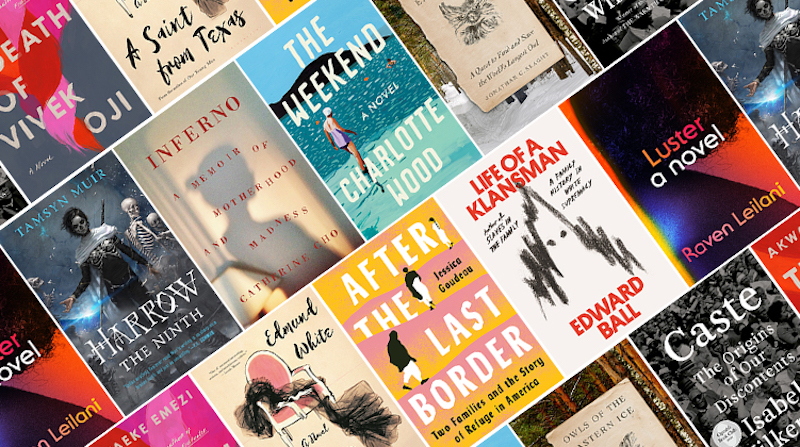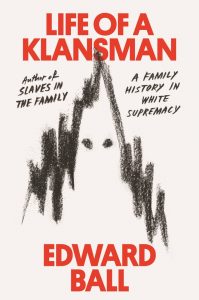
Raven Leilani’s Luster, Akwaeke Emezi’s The Death of Vivek Oji, Isabel Wilkerson’s Caste, and Jonathan C. Slaght’s Owls of the Eastern Ice all feature among the Best Reviewed Books of the Week.
1. Luster by Raven Leilani
6 Rave • 6 Positive • 1 Mixed
“… vibrant, spiky … Leilani is such a funny writer that the despair of Edie’s predicament isn’t clear until she’s fully immersed in it … But Leilani is a master of darker, more deadpan humor … As the situation destabilizes, growing uncomfortably thick with noblesse oblige, the metaphors get sharper … distinguished by its focus on race, which raises the stakes for the story. The climax emphasizes that for all of her wit and flexibility, Edie is ultimately a Black woman in a white neighborhood. She’s treated as an assistant, then an interloper and finally an invader … But Leilani is also a major new talent because her command of style and characterization is so strong. Tucked within the story of her life with Eric’s family are scraps of Edie’s own life, which emerge as she becomes more aware of her third-class treatment and her capacity to escape it. In that regard, Luster isn’t just a sardonic book, but a powerful one about emotional transformation. Edie shrewdly learns how to find strength in her jadedness, not just resignation. She becomes wise at ‘parsing the intent of the jaws that lock around my head.’ ”
–Mark Athitakis (USA Today)
2. Harrow the Ninth by Tamsyn Muir
7 Rave • 2 Postive
“This brilliant, confounding, and heartstopping sequel will quench the thirst of the fans, but not without leaving a new set of mysteries to keep us hooked … Muir’s back with the same unique writing style, if not more visceral and more atmospheric. The author describes everything in great detail and uses metaphors and other literary devices that make certain lines and moments so poetic and powerful. I also loved that we get to see the signature humour and sarcasm we first witnessed back in Gideon. … mind-boggling from start to finish, and it’s an electrifying sequel you do not want to miss.”
–Alexandra Nae (The Nerd Daily)
3. The Weekend by Charlotte Wood
3 Rave • 7 Positive • 1 Mixed
“…[a] playful and moving feminist fairytale … Wood has wisely not tried to outdo her own shock tactics. The Weekend, her sixth novel, returns to the qualities that had already built an admiring readership for her earlier books while being a more domesticated sister to its wild predecessor … more Big Chill than Handmaid’s Tale, with a dash of Big Little Lies and an echo of Atwood’s The Robber Bride. Wood uses the classic theatrical set-up of a house party to concentrate tension in a tight space. If she were Agatha Christie this would lead to murder, but her characters’ emotional blow-ups are closer to those in David Williamson’s Don’s Party or Rachel Ward’s recent film Palm Beach … Behind the laughs there is deep humanity, intellect and spirituality, qualities that mark The Weekend as much more than old-chook lit … The Weekend is a novel about decluttering and real estate, about the geometry of friendship, about sexual politics, and about how we change, survive and ultimately die. Wood has captured the zeitgeist again, with a mature ease that entertains even as it nudges our prejudices.”
–Susan Wyndham (The Guardian)
4. The Death of Vivek Oji by Akwaeke Emezi
6 Rave • 2 Positive
“Where Freshwater refuses traditional storytelling, Vivek Oji adopts the form—though never the spirit—of traditional crime fiction, seeming to glory in the genre’s conventions before slyly subverting them … It’s always impressive to see a writer transform between novels in this way, but Vivek Oji would be impressive regardless. Emezi deftly tucks doomed romance and family drama into mystery, then, slowly but surely, reveals their true aim: to construct a portrait of love triumphant over death … Emezi abandons death to focus on the complicated joys of Vivek’s life, which I very much do not want to spoil for the reader, but which are joyful indeed … If Emezi keeps one norm from crime fiction, it is their use of stock characters, who abound…Literary writers and critic often scorn characterization this flat, but Emezi uses their stock characters effectively as points of contrast to the mutable, grieving Kavita and Osita—and, more importantly, to Vivek. Instead of getting flattened by death, Vivek becomes more vivid on each page. He glows like the sun, impossible to look at directly yet utterly charismatic. I missed him when the novel was done.”
–Lily Meyer (NPR)
5. A Saint From Texas by Edmund White
4 Rave • 4 Positive • 1 Mixed
“Rules are made to be broken by the brilliant. It is Edmund White’s narrative brilliance that allows him to break the inviolable First Commandment of writing classes, ‘Show, don’t tell,’ and give us the divinely well-told tale of identical twins who set out to answer the question: Can Texas be transcended? … White’s miracle is how he manages to deliver an epic that covers five decades, several precisely observed cultures and a host of indelible characters in a little under 300 pages … It is not surprising that White, a renowned Francophile and author of biographies of Jean Genet, Marcel Proust and Arthur Rimbaud, can capture French culture with ironclad authority … Always an anthropologically acute observer of cultural footprints and foibles, White reserves his sharpest satirical barbs for the most deserving targets: the French aristocracy, racists, frat boys, social climbers, fortune hunters and ‘terrible Texas Baptists’ with their ‘shallow, bigoted, self-satisfied religion!’.”
–Sarah Bird (The New York Times Book Review)
Read an excerpt from A Saint From Texas here
**
1. Caste: The Origins of Our Discontents by Isabel Wilkerson
14 Rave • 1 Positive • 1 Mixed
“…elegant and persuasive … She has, in particular, a masterly command of the complex extended metaphor … What distinguishes Wilkerson is her grasp of the power of individual narratives to illustrate such general ideas, allowing her to tell us what these abstract notions have meant in the lived experience of ordinary people … The dexterity with which she combines larger historical descriptions with vignettes from particular lives, recounted with the skill of a veteran reporter, will be familiar to readers of The Warmth of Other Suns … Caste will spur readers to think and to feel in equal measure. Its vivid stories about the mistreatment of Black Americans by government and law and in everyday social life—from the violence of the slave plantation to the terror of lynchings to the routines of discourtesy and worse that are still a common experience for so many—retain their ability to appall and unsettle, to prompt flashes of indignation and moments of sorrow. The result is a book that is at once beautifully written and painful to read.”
–Kwame Anthony Appiah (The New York Times Book Review)
2. Owls of the Eastern Ice: A Quest to Find and Save the World’s Largest Owl by Jonathan C. Slaght
8 Rave • 2 Positive
“Slaght has a rare gift for startling evocations of the natural world … Primoye is a remarkable place, and Slaght’s passion for it is palpable; his fascination with fish owls, too, the reader quickly understands and shares. But I can’t help feeling that the real subject of this book is neither forests nor owls, but fieldwork … Slaght is a wonderful guide to the reality of fieldwork, a pursuit marked by tests and tribulations that will inspire and drain you, corrode your faith and devotion to your cause, induce vast mood-swings that range from despair to dizzying elation, and that requires a suite of personal and practical skills far from those of a lab-bound scientist. His quest has deep moral, as well as personal significance … Unlike much current nature writing, Owls of the Eastern Ice does not treat encounters with wild creatures as opportunities for the writer to explore their own emotional and psychological landscape, or to kick-start a discussion of literature, philosophy or social history. In this regard, Slaght’s book is refreshingly old-school, a tautly strung adventure featuring not just the narrator, but his co-workers, his crew. These men crowd the pages fabulously[.]”
–Helen Macdonald (The Guardian)
3. After the Last Border: Two Families and the Story of Refuge in America by Jessica Goudeau
7 Rave • 2 Positive
“… simply brilliant, both in its granular storytelling and its enormous compassion. This book should be required reading for anyone trying to understand the challenges of getting to and surviving in the United States in the Trump era, and it would make an excellent, subversive gift for those who believe that closing our borders is the best way to keep America strong … offers a crash course in how shifts in public attitudes and, in turn, United States policy have helped and hindered people desperate to escape the poverty or violence in their homelands … What makes this book so different from other works that tell similar stories is the talent and doggedness of Goudeau, who spent years working with refugees in Austin, and brings an insider’s authority to the page. But she also clearly grasps that nonfiction narratives like these rise and fall on the small details that reveal a character’s humanity; Goudeau understands the metaphorical power of a beloved courtyard where family gatherings will never occur again, and the fear inspired by the sideways glance of a newly minted government soldier who may or may not be a friend on any given day … Reading After the Last Border will make you wish that more Americans would take a critical look at themselves and ask whether we are who we want to be, or whether we have lost our allegiance to the dreams that still inspire so many to try to reach our shores.”
–Mimi Swartz (The New York Times Book Review)
4. Inferno: A Memoir of Motherhood and Madness by Catherine Cho
8 Rave
“She writes powerfully about the disorienting shift in her sense of self … Inferno contains excerpts from a notebook Cho kept during her hospitalisation, while she was still uncertain how she came to be there and how best to be released … Given that becoming a mother is haloed with sentimentality for too many people, Cho is courageous in sharing her harrowing descent into postpartum psychosis. With its clear-eyed view of how a family’s cultural expectations can torment a well-educated, cosmopolitan woman giving birth for the first time, Inferno is a welcome addition to the small and growing shelf of memoirs where…women tell true stories of the often overwhelming cost of bringing a child into the world.”
–Mary Cregan (The Irish Times)

5. Life of a Klansman: A Family History in White Supremacy by Edward Ball
4 Rave • 4 Positive • 2 Mixed
“A violent legacy stirs a deep meditation on the nature of racism in this anguished study of Civil War–era New Orleans … He also vividly reconstructs the mindset that propelled Lecorgne—a resentful, working-class striver nostalgic for his family’s formerly privileged position atop New Orleans’ complex racial hierarchy—into racist activism … a clear-eyed work of historical reclamation and an intimate, self-lacerating take on memory and collective responsibility.”
Read an excerpt from Life of a Klansman here

